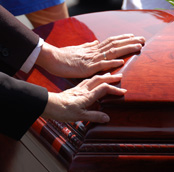Wrongful Death
 When a member of your family dies because of the carelessness or negligence of another person, you have a right to seek compensation for your losses, including the support they would have provided, any funeral and burial expenses, and, in some states, for loss of companionship or consortium.>
When a member of your family dies because of the carelessness or negligence of another person, you have a right to seek compensation for your losses, including the support they would have provided, any funeral and burial expenses, and, in some states, for loss of companionship or consortium.>
A wrongful death lawsuit allows you to pursue financial compensation when someone else causes the death of a loved one.
Recovering Damages in a Wrongful Death Lawsuit
The laws governing wrongful death actions vary from state to state, but all states limit the parties who can seek compensation to certain family members, typically spouses and children. In a few jurisdictions, parents may recover damages for the death of a child. A wrongful death lawsuit is customarily brought by the personal representative of the estate, who will be either named in the deceased’s will, or appointed by the probate court.
Types of Damages Recoverable in a Wrongful Death Action
The losses for which the estate may recover also vary from state to state. However, generally, all financial (also known as “pecuniary”) losses are recoverable. This includes:
- Any financial support that the deceased would have provided;
- Any un-reimbursed medical expenses incurred by the estate because of the accident that caused death; and
- Any funeral or burial expenses.
Some states allow what are known as non-economic damages. For example, a spouse may recover for loss of consortium/companionship, or for the loss of the services the decedent would have provided to the home. Other states allow children to obtain compensation for “loss of guidance and nurture.”
In extremely limited situations, the estate may be able to pursue and recover punitive damages, an award designed to hold the wrongdoer additionally accountable for wanton or egregious behavior that caused the death.
Survival Actions
Most states allow an estate to file what is called a “survival action” after a wrongful or accidental death. The primary difference between a wrongful-death lawsuit and a survival action is that a wrongful-death action allows the estate to recover compensation for losses suffered by those who are still living, including the children or spouse. A survival action, on the other hand, seeks damages that the deceased would have incurred had he or she not died. Accordingly, heirs cannot recover compensation in a wrongful-death lawsuit for the pain and suffering experienced by the defendant, but the estate could recover for those losses in a survival action.
Connect with Top-rated Attorneys Near You
Sponsored Advertisement
Other Personal Injury Law Center Topics
Damages
Your Rights When You Have Been Injured by a Dangerous or Defective Product
Adderall and Ritalin
Protecting Your Legal Rights After a Car Accident
Your Rights After a Construction Accident
Defective Drug Claims
Defective Drugs and Medical Devices Law Center
Dog Bites
Fosamax
Hormone Replacement Therapy
Ketek
Kugel Mesh Patch
Recovering Compensation After Medical Malpractice
Medtronic Defibrillators
Medtronic Pacemakers
Understanding Negligence in a Personal Injury Claim
Neurontin
Nursing Home Neglect and Abuse
Ortho Evra
Other Personal Injury
Other Professional Malpractice
Your Rights in a Premises Liability Claim
Prempro
Seroquel
Sulzer Hip Implants
Toxic Tort
Trucking Accidents
Zyprexa
Defective Drugs & Medical Devices
Latest Article
What Is a Trust Fund? A Comprehensive Guide
A trust fund is a powerful tool that has stood the test of time. It is an essential instrument in modern wealth manageme... Read More
Arraignment: Meaning, Common Charges, & Process
Arraignment is a pivotal moment within the criminal justice system, marking the formal initiation of criminal proceeding... Read More
What Is Probable Cause? Definition and Examples
The Constitution protects you from being searched without a valid reason. But what exactly constitutes a valid reason? A... Read More
GETLEGAL®ATTORNEY DIRECTORY
Find Leading Attorneys in Your Area
NEED PROFESSIONAL HELP?
Talk to an Attorney
How It Works
- Briefly tell us about your case
- Provide your contact information
- Choose attorneys to contact you





